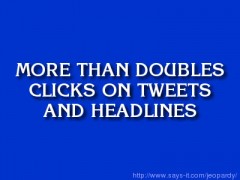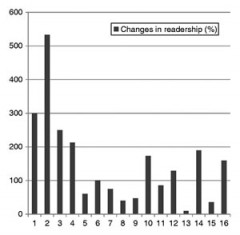Can You Double Your Clicks with the Jeopardy Effect?
 Do you want more clicks on your tweets? Or, on your marketing links in emails or ads? Or, if you are a blogger, journalist, or content writer, could you do with more traffic to your articles? A new study by researchers at the BI Norwegian Business School demonstrates that phrasing headlines in a particular way more than doubled clicks, on average.
Do you want more clicks on your tweets? Or, on your marketing links in emails or ads? Or, if you are a blogger, journalist, or content writer, could you do with more traffic to your articles? A new study by researchers at the BI Norwegian Business School demonstrates that phrasing headlines in a particular way more than doubled clicks, on average.
The Jeopardy Effect
What’s the unique premise of Jeopardy, the long-running TV trivia series? The show’s odd quirk, and perhaps part of its secret to success, is that contestants must phrase their response in the form of a question. Competitors have lost when they had the correct answer but failed to offer it as a question. It turns out that there’s an important lesson there for marketers and writers, too.
The Norwegian researchers found that what is mandatory on Jeopardy also works in attracting clicks to tweets and ad headlines. Multiple experiments showed that writing headlines in question format almost always increased clicks, and sometimes boosted the click rate by as much as 3, 4, and even 5 times! On average, question headlines outperformed declarative headlines by 140 – 150%.
 In one experiment, they posted separate headlines on Twitter using similar accounts. The post could be declarative, like:
In one experiment, they posted separate headlines on Twitter using similar accounts. The post could be declarative, like:
“The hunt for status in the advertising business”
Or, it could be rewritten as a question:
“Why are advertisers so obsessed with winning prices?”
As the graph shows, in every case the question headlines drew more traffic. In some cases, traffic was multiplied many times.
Time for The Daily Double!
What worked even better than question headlines? The scientists found that making the tweets and headlines “self-referencing,” i.e., referring to the reader, provided an additional boost to the average click rates. So, one would expect,
“Are Bosses All Jerks?”
to draw more clicks than the declarative version,
“Bosses Can Be Jerks Sometimes”
but not as well as one that references the reader personally,
“Is Your Boss a Jerk?”
Should You Always Use Question Headlines?
Any approach to boosting clicks on tweets, article headlines, etc. can become less effective if overused. There are many techniques for writing catchy headlines. In the right context, lead-ins like, “The Top 10 Ways To…” or “The Common Mistake That Will…” may work better. So, don’t use questions exclusively, or any other type of headline for that matter. Rather, use question headlines where they will add some life to a topic, and if you can, further engage the reader with a “you” or “your” in the headline.
One great source of headline writing tips is Copyblogger.com, where Brian Clark and his team have assembled some of their best tips into an e-book, How to Write Magnetic Headlines. Or, if you prefer to graze the Copyblogger site, try this Google search. That search yielded 822 results, and the first page alone is packed with relevant articles. Making question headlines just part of a mix of other effective headline styles will keep them fresh and effective.
Back to Jeopardy
So, when you say, “I’ll take ‘Traffic Boosters’ for $800, Alex!” and the clue shown in the image flashes on the board, what will you do?
You’ll respond, in best Jeopardy style, “What are question headlines?”
